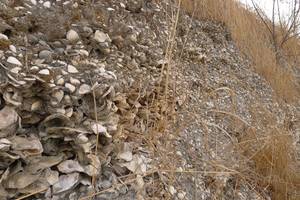Early humans get a taste for seafood
Interview with
Sarah - And now, it's time to bring humans into the story, and look at the history of our relationship with the marine realm...
Paul - We can certainly tell that Neanderthals perhaps as much as 100,00 0 years ago were exploiting some sea food.
Sarah - Paul Pettit from the University of Sheffield.
 Paul - In Gibraltar for example we have two caves, Gorham's Cave and Vanguard Cave, where Neanderthals are not only carrying shellfish into these caves but they're breaking them open in predictable ways by the edge of a fire. SO this is deliberate humans consumption of these.
Paul - In Gibraltar for example we have two caves, Gorham's Cave and Vanguard Cave, where Neanderthals are not only carrying shellfish into these caves but they're breaking them open in predictable ways by the edge of a fire. SO this is deliberate humans consumption of these.
Sarah - And it's not just a case of finding debris such as shells in caves that gives us evidence that early human species were getting a taste for marine foods...
Paul - Staple isotope studies have really matured over the last 15 years or so, and the beautiful things about human beings of course is that we are to a large extent what we eat, and so our bones carry an isotopic signature of where we're deriving at least our dietary protein from. And we now have a number of stable isotope analyses on human bones way back in to the last 100,000 years of the Pleistocene particularly for Neanderthals and for early members of our own species.
And what this tells us is that marine food stuff was pretty much insignificant for the Neanderthals. If they were eating it is was probably when they happened to have a stroll on the beach and there was some shellfish around or a dolphin has just beached itself. But what they do tell us by contrast that from at least 50,000 years ago, Homo sapiens were now incorporating quite large amounts of aquatic, that is riverine, and marine resources in the diet as well. So our stable isotope analyses of that, of the carbon and nitrogen in them, are greatly complementary to what we can see on archaeological sites. They do tell us that fish is being procured in good numbers from 50,000 years ago, we may not see the means that those fish are being procured by, but they are already making a decent stamp on the diet.
Sarah - But even 50 thousand years ago, when fish and shellfish started to form a significant contribution to the diet, it still wasn't 'fishing' as we would understand it today...
Paul - When we talk about a real marine economy, getting out in ships with nets you drags behind the boats and so on, is really much later and we can count that in a handful of thousands of years rather than tens of thousands of years.
From a European perspective we call it the Neolithic or Bronze Age. And this develops as a series of island hoppings, this isn't open ocean fishing of the like that we're used to. It's probably exploiting marine resource while still in fairly easy contact with the coast, probably in many cases still in sight of a coast of one form or another.
Sarah - However these foods were collected, it's clear that they were hugely important.
Paul - Certainly coastal resources seem to have been a critical part of the evolution of our own species and we have a number of sites on the coast of South Africa and on the Horn of Africa too that reveal our own species using shellfish 100-130,000 years ago. The important thing especially when we view this in its wider dietary context, this is the time when Homo sapiens begins broadening the spectrum of their diet, in many ways, not just using the coastal and marine realm and the riverine realm, but also exploiting small animals, things that move fast, don't repay you if you have to chase them down and spear them, but do repay you very well if you're able to set traps. So when we see this broad spectrum economy coming about its very clear that our own species had reached some kid of dietary threshold in which they were far more resilient to ecological pressures, problems with the waxing and waning of resources in the landscape. So the more elements in your diet, terrestrial or marine, makes you a far better survivor, particularly in those unstable climatic and environmental oscillations of the last ice age.
Sarah - So our ancestors' ability to exploit a wide range of foods, including marine resources, undoubtedly contributed to our success and spread across the globe. That was Paul Pettit from the University of Sheffield. To find out about how we have gone on to
- Previous Exploring the oceans
- Next The age of marine reptiles










Comments
Add a comment